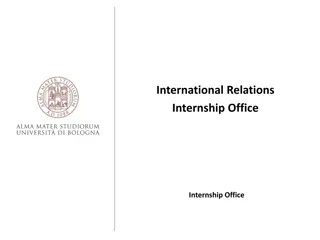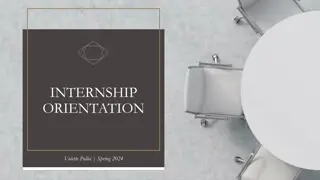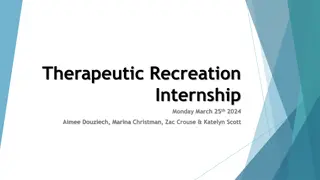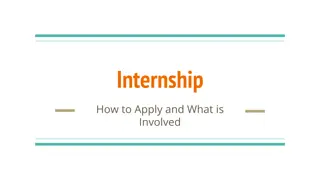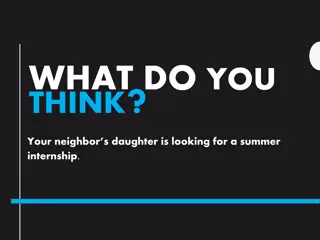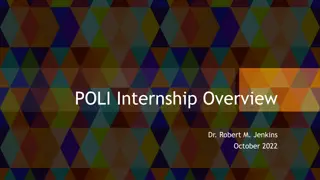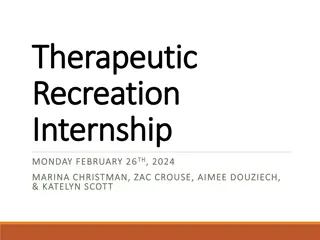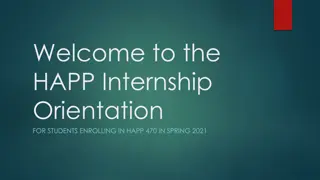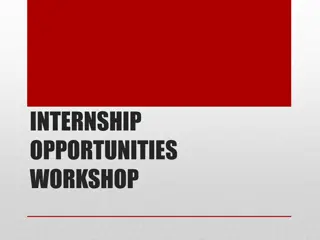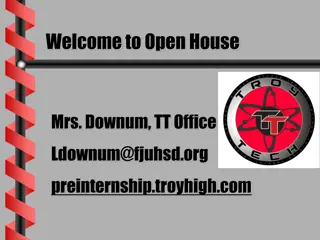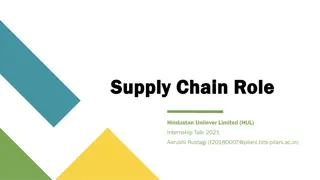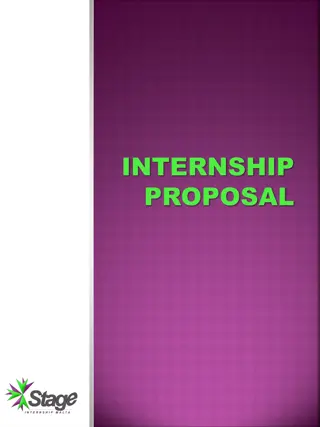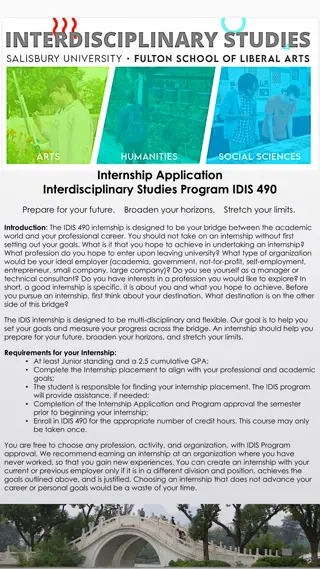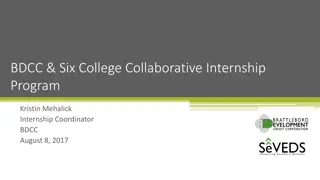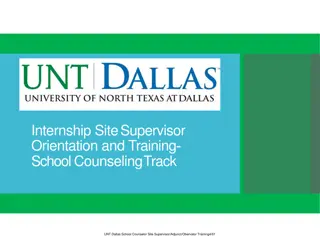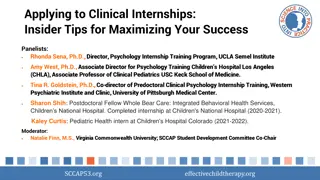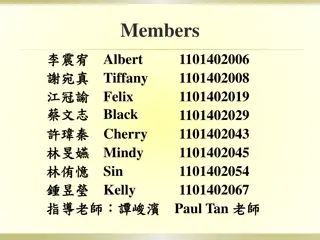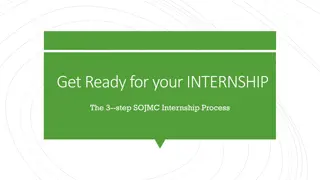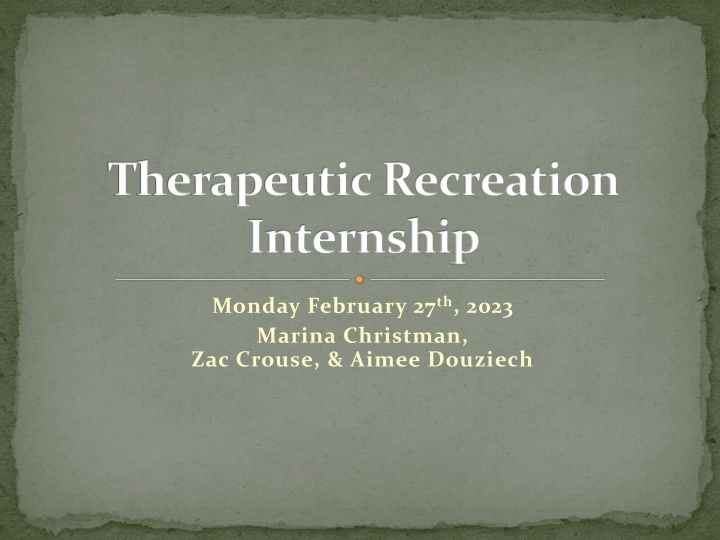
Therapeutic Recreation Internship Guidelines and Responsibilities
Explore student responsibilities, internship preparation steps, contacting supervisors, and agency interactions for a successful therapeutic recreation internship. Get insights on timelines, applications, and crucial tasks before starting your placement.
Download Presentation

Please find below an Image/Link to download the presentation.
The content on the website is provided AS IS for your information and personal use only. It may not be sold, licensed, or shared on other websites without obtaining consent from the author. If you encounter any issues during the download, it is possible that the publisher has removed the file from their server.
You are allowed to download the files provided on this website for personal or commercial use, subject to the condition that they are used lawfully. All files are the property of their respective owners.
The content on the website is provided AS IS for your information and personal use only. It may not be sold, licensed, or shared on other websites without obtaining consent from the author.
E N D
Presentation Transcript
Therapeutic Recreation Internship Monday February 27th, 2023 Marina Christman, Zac Crouse, & Aimee Douziech
Agenda Student Responsibilities before the internship Recommendations for contacting potential supervisors Cover letter & Resume Information on assignments Suggested Internship Timeline during placement Things to do in the next few weeks
STUDENT RESPONSIBILITIES Before the Internship (12 1 months prior) Reflect on what population, setting, agency, and geographic area you wish to complete the internship. Complete the pre- internship survey. *should already be done ***Review and familiarize yourself with NCTRC Standards and the Student Internship Guide (nctrc.org). ***Prepare a current and up-to-date resume and cover letter with list of references. Thoroughly review the University of Lethbridge s Internship Manual (will be available April 2023). Complete an application for internship to a specific agency or start looking for a supervisor that you can contact directly. Prepare for your interview.
The agency will contact you for an interview. Once interviewed you will be contacted by the agency if you are a successful candidate. It is highly recommended that you provide the agency a response regarding your acceptance no later than one week after being contacted by them. Although you may have more than one potential option, it is important to be decisive and timely as this reflects on your professionalism. Confirm internship by completing Internship Agreement and submitting all required documentation. Review the agency/site prerequisites for the internship (do you need CPR, mask fit testing, etc.), ask your agency supervisor. Inquire about the agency s dress code by contacting the agency/site supervisor in advanceand be sure to inquire about the working schedule and any other questions you may have. Prepare a personal budget to make certain you have the finances to support participation in the internship for 15 weeks. Ensure you have adequate accommodations in place.
Contacting Supervisors NCTRC database (linked on the website), other professional organizations (CTRA, ATRA, etc.) Network conferences, volunteering, etc. Internships with AHS, Covenant, VCH, NSHA etc. Do NOT contact employees directly. These organizations have specific processes in place for contacting their employees. For example: AHS will provide us a list of potential supervisors and settings that we will then share with you. ***Make sure you do your own research to find out the organization s student placement process, including if you can contact the supervisor directly. If you are still unsure, ask us. ***Based on your completed pre-internship survey, we will try to help guide you, however, this process is student directed. You need to take your own initiative. We work towards providing you a list of potential sites and supervisors, but keep in mind this list is not all-encompassing: Mid-April for Fall 2023 internships August for Spring 2024 internships
Cover Letter The purpose of a cover letter is to let an agency know that you are interested in an internship and that you are qualified. Through this letter, you must make the agency want to give you an interview. This is the agency s first impression of you! Some guidelines are the following: Every cover letter should be written in your own words. Pay careful attention to spelling, punctuation, grammar, and style. The letter should be no more than one page in length. https://www.uleth.ca/career-bridge/career-services
What to include in your Resume Previous work in TR or assistant roles Previous work in recreation and leisure areas Your college/university placements with lots of detail Education background (high school not needed) All experiences here at U of L Field Trips, labs, and events, Clubs, Facilitation experiences, TR month planning and implementation, etc. Are you member of ATRA, CTRA, others? Any committees? Volunteer work? Attend regular meetings? Volunteer experience Certifications related to health and human services
Resume Writing Tips Attention to spelling, punctuation, grammar, and style. Proofread your resume using a dictionary and have other people proofread it. Organize information in a logical fashion. Keep descriptions clear and to the point. Confine your information to two pages. Use a simple, easy-to-read font. Include as much work experience detail as possible, especially the transferable areas. Tailor your information to the population/setting. https://www.uleth.ca/career-bridge/career-services
Information on Assignments Assignments should generally be done on your own time outside of the agency; however, there may be aspects of your assignments that need to be done at your agency (e.g., access to certain documents, discussion with residents, etc.). It s important to discuss these aspects with your agency/site supervisor.
SMART Goals 5% of final grade You will be creating goals to help guide your internship. Both you and your agency/site supervisor have shared responsibilities in ensuring these are achievable. Communication is an important aspect in developing your goals. Make sure your goals are SMART (specific, measurable, action-oriented, realistic, and time-based). Grading will be based on the evaluation completed by your agency/site supervisor; however, your academic supervisor will be reviewing the goals and giving the final grade.
Weekly Online Discussion 20% of final grade The discussions/forums will include weekly questions posted on Moodle. Lots that can be learned when reflecting and having shared discussion with peers. Grading is on Moodle. Your academic supervisor/instructor will be evaluating and grading the discussions.
Service Project 30% of final grade It needs to be something useful to your agency! This project is your responsibility from start to finish and it should be guided by your experience at your agency. Are there areas that need further development, gaps in care, needed program support/evidence to support, etc.? What are your strengths that you can bring to this project? Communication with your agency/site and academic supervisor is important in developing a plan. Examples: Comprehensive program plan Multiple specific program plans/protocols Case study Grading: draft, update, and final. Both your agency/site supervisor and your academic supervisor are evaluating and grading your service project.
Evaluations 45% of final grade Midterm and Final Evaluation Completed by your agency/site supervisor and graded by your academic supervisor. Above 80% means you are progressing exceptionally well. 70-80% means you are progressing well and that your skills are on track. Below 70% means you may need to put extra effort into ensuring you are developing the necessary skills. The course is a Pass/Fail in which you must obtain a mark higher than 70%
Suggested Timeline During Placement Tasks Completed Date Orientation to Facility / Department Services delivered Communication Professionalism Writing goals & objectives Time management Risk Management Infection Control Review Policies and Procedures Manual, as well as important legislative acts (such as FOIP, Mental Health Act, etc.) Discuss & review student s goals Discuss the evaluation forms with your supervisor Complete the following forms: Confidentiality Agreement and Crisis Support Plan SMART Goals Introduction to Other Disciplines / co-workers Review University Assignments / Tasks Brainstorm Special Service Project Ideas Observe an intervention (group or 1:1) Observe an Assessment WEEK 1 2 Due: After 2 days Due: End of week 2
Define Project & Outline special project Complete Initial Assessment Caseload Minimum of 1 person/client/patient Co-facilitate an intervention Begin the Self-Reflection online discussion on Moodle Continue work on Special Service Project Midterm Evaluation given to Agency Supervisor to review prior to completion Complete Progress Notes Complete Discharge Summary Target: 25% of supervisor s caseload Facilitate an intervention on your own Complete minimum 3 Assessments Due: End of Week 3 (5%) Due: End of Weeks 3-12 (20%) WEEK 3 4 WEEK 5 6
Target: 50% of supervisors caseload Continue to complete more Assessments Complete evaluations on activities/interventions/programs Midterm Evaluation Complete Update on Special Service Project Continue to contribute to the online Self- Reflection discussions Target: 75% of supervisor s caseload Continue to complete more Assessments Continue to complete evaluations on activities/interventions/programs Complete the final Self-Reflection online discussion on Moodle WEEK 7, 8, 9 Due: End of Week 8 (10%) Due: End of Week 7 (5%) WEEK 10,11,12 Last one End of Week 12
Special Service Project Presentation to Departmental Staff and Agency Supervisor Final Evaluation given to Agency Supervisor to look over and set a date for a review Submit SMART Goals evaluation Target: 100% of supervisor s caseload Special Service Project Final Presentation Assessment Evaluation Form Student Self-Evaluation Form Documentation of Internship Form Exit Interview / Final Evaluation End professional relationships with clients and staff members. Thank people and stay in contact with your supervisor. WEEK 13 14 Due: End of week 14(5%) Due: End of Week 15 (20%) WEEK 15 Due: End of Week 15 Due: End of Week 15 Due: End of Week 15 (35%)
Things to do over the next few weeks HSPnet Consent Form & FoHS Consent Form(submit to Marina). Start to plan for the Police Information Check including Vulnerable Sector Search (reduced cost form on website). Start gathering immunization records and Immunization History Form. Work on resume and cover letters. Book an appointment with Career Services to review your resume and cover letter. Ask friends, peers, and family to provide feedback. Review the Uleth TR website to see all the information and documents related to the internship.
Additional Information Website for the TR program https://www.uleth.ca/healthsciences/tr Website for the TR practicum/internship https://www.uleth.ca/healthsciences/practicum- therapeutic-recreation
Next Meeting Monday March 27th from 4-6pm MT Meeting will be recorded and posted on our website Focus will be on more internship information documents, application process, internship preparation, internship manual


